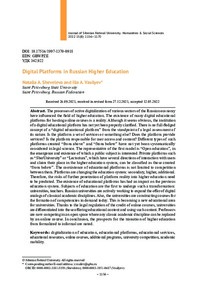Digital Platforms in Russian Higher Education
Скачать файл:
URI (для ссылок/цитирований):
https://elib.sfu-kras.ru/handle/2311/147471Автор:
Sheveleva, Natalia A.
Vasilyev, Ilia A.
Шевелева, Н. А.
Васильев, И. А.
Дата:
2022-08Журнал:
Журнал Сибирского федерального университета. Гуманитарные науки. Journal of Siberian Federal University. Humanities & Social Sciences; 2022 15 (8)Аннотация:
The processes of active digitalization of various sectors of the Russian economy have influenced the field of higher education. The existence of many digital educational platforms for hosting online courses is a reality. Although it seems obvious, the institution of a digital educational platform has not yet been properly clarified. There is no full-fledged concept of a “digital educational platform” from the standpoint of a legal assessment of its nature. Is the platform a set of services or something else? Does the platform provide services? Is the platform responsible for user access and content? Different types of such platforms created “from above” and “from below” have not yet been systematically considered in legal science. The representative of the first model is “Open education”, in the emergence and existence of which a public subject is interested. Private platforms such as “SberUniversity” or “Lectorium”, which have several directions of interaction with users and claim their place in the higher education system, can be classified as those created “from below”. The coexistence of educational platforms is not limited to competition between them. Platforms are changing the education system: secondary, higher, additional. Therefore, the risks of further penetration of platform reality into higher education need to be predicted. The existence of educational platforms has had an impact on the previous education system. Subjects of education are the first to undergo such a transformation: universities, teachers. Russian universities are actively working to expand the offer of digital analogs of classical academic disciplines. Also, the universities are constructing courses for the formation of competencies in demand today. This is becoming a new educational area for universities. Thanks to the legal regulation of the credit of online courses, universities are differentiated into those offering educational content and using such content. Professors are now competing in an open space where any classic academic discipline can be replaced by an online course. In conclusion, the prospects for the transition of higher education from formalized to informal are noted Процессы активной цифровизации разных отраслей российской
экономики повлияли на сферу высшего образования. Существование многих
цифровых образовательных платформ для размещения онлайн-курсов
является
реальностью. При кажущейся очевидности институт цифровой образовательной
платформы пока не исследован должным образом. Не существует полноценного
понятия «цифровая образовательная платформа» с позиции юридической оценки ее
природы. Платформа – набор сервисов или что-либо иное? Оказывает ли платформа
услуги? Несет ли платформа ответственность за доступ пользователей и содержание?
Системно в юридической науке пока не были рассмотрены разные виды таких
платформ, создаваемых «сверху» и «снизу». Представителем первой модели является
«Открытое образование», в появлении и существовании которого имеет интерес
публичный субъект. К создаваемым «снизу» могут быть отнесены частные платформы,
такие как «СберУниверситет» и «Лекториум», имеющие несколько направлений
взаимодействия с пользователями и претендующие на свое место в системе высшего
образования. Сосуществование образовательных платформ не исчерпывается
конкуренцией между ними. Платформы меняют систему образования: среднего,
высшего, дополнительного. Поэтому нуждаются в прогнозировании риски дальнейшего
проникновения платформенной реальности в высшее образование. Существование
образовательных платформ оказывает влияние на прежнюю систему образования.
Первыми подвержены такой трансформации субъекты образования: университеты,
преподаватели. Российские университеты активно работают над расширением
предложения цифровых аналогов классических учебных дисциплин, а также курсов
для формирования востребованных сегодня компетенций. Это становится новым
образовательным направлением для вузов. Благодаря нормативному праву зачета
онлайн-курсов
происходит дифференциация университетов на предлагающих учебный
контент и пользующихся таким контентом. Преподаватели теперь конкурируют
в открытом пространстве, когда любая классическая учебная дисциплина может быть
заменена онлайн-курсом.
В завершение отмечены перспективы перехода высшего
образования от формализованного к учитывающему неформальные составляющие
Коллекции:
Метаданные:
Показать полную информациюСвязанные материалы
Показаны похожие ресурсы по названию, автору или тематике.
-
The School in the Socio-Cultural Space of the Modern Village
Lopatina, Anastasya M.; Lukina, Antonida K.; Peterson, Irina R.; А.М. Лопатина; А.К. Лукина (Сибирский федеральный университет. Siberian Federal University, 2008-06)The results of sociological research into the state of education in modern Siberian villages are presented. The essential differences between rural and urban schools are given, and the basic functioning of village schools ... -
Information and Education Systems in the Context of Digitalization of Education
Karakozov, Sergey D.; Ryzhova, Natalia I.; Каракозов, С. Д.; Рыжова, Н. И. (Сибирский федеральный университет. Siberian Federal University, 2019-09)The article describes the changes in the modern socio-economic environment, which affect the digitalization of society, including the socio-educational sphere. On the basis of the authors’ proposals for the development ... -
Practice-based Approach to Teaching University Students: Trends in Foreign Didactics
Tarev, Boris V.; Тарев, Б.В. (Сибирский федеральный университет. Siberian Federal University, 2015-11)The article deals with current trends in teaching University students by means of Practice-based approach. The approach that is based on practice is widely represented in contemporary Didactics in foreign countries because ... -
Aspects of Applying Distance Education Technologies in the System of University Students Training
Turanova, Larisa M.; Styugin, Andrey A.; Туранова, Л.М.; Стюгин, А.А. (Сибирский федеральный университет. Siberian Federal University., 2015-03)The processes of informatization of education require considering changes of the informational space of the educational system. Taking into consideration Federal Law “On Education in the Russian Federation”, N 11-FZ dated ... -
Accidents of the Regional Education in the Sphere of Culture and Arts of the Contemporary Russia
Irkhen, Irina I.; Ирхен, И.И. (Сибирский федеральный университет. Siberian Federal University., 2016-02)The subject of the present research is comprised by the regional processes in sphere of culture and arts through the prism of personality. On the material of the applied sociological study by the author in eight subjects ...

